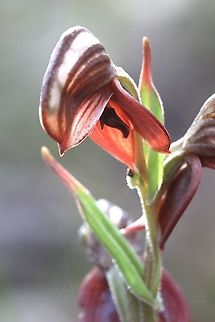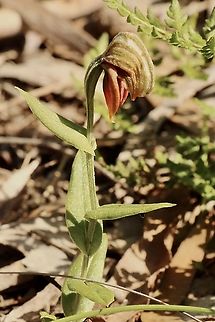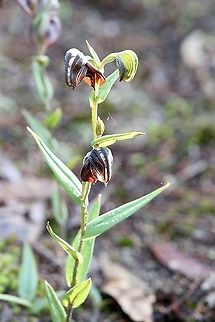
Appearance
''Pterostylis sanguinea'', is a terrestrial, perennial, deciduous, herb with an underground tuber. Non-flowering plants have a rosette of between three and ten, linear to lance-shaped leaves, each leaf 20–40 mm long and 6–15 mm wide, the leaves on a stem 20–40 mm long.When flowering, there are twelve or more dark reddish-brown, green or green and brown flowers borne on a flowering spike 150–400 mm high. The flowering spike has between six and ten stem leaves which are 20–50 mm long and 6–12 mm wide. The flowers are 15–25 mm long, 12–20 mm wide.
The dorsal sepal and petals form a hood over the column. The lateral sepals turn downwards, are 11–14 mm long, 12–14 mm wide and joined for most of their length. The labellum is dark brown, hairy and insect-like, about 6 mm long, 4 mm wide and flicks upwards when touched. Flowering occurs from June to September.

Naming
''Pterostylis sanguinea'' was first formally described in 1989 by Mark Clements and the description was published in ''Australian Orchid Research'' from a specimen collected in Belair Recreation Reserve in South Australia. The specific epithet is a Latin word meaning "bloody" or "blood-red" referring to the sometimes blood red colour of the flowers of this species.
Distribution
''Pterostylis sanguinea'' occurs in Western Australia from north of Kalbarri in the north to Toolinna Cove in the east, in the south-east of South Australia and in disjunct areas of Victoria, west from Yarram. In Tasmania it is only found in the Strzelecki National Park on Flinders Island.Status
''Pterostylis sanguinea'' is classified as "not threatened" by the Government of Western Australia Department of Parks and Wildlife. In Tasmania it is classed as "rare" under the ''Threatened Species Protection Act 1995''.Habitat
It grows in forest and woodland in well-drained soils.References:
Some text fragments are auto parsed from Wikipedia.